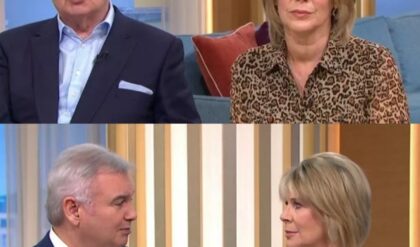SHOCK: Eamonn Holmes reveals he was extremely ‘outraged’ at Donny Osmond because Dony and Ruth ‘h.a.v.e s.3.x’ while he was in the hospital for treatment – celebrity.xinloc.com
Eamonn Holmes admitted he “hated” Donny Osmond before he met him during an appearance on GB News.
The TV presenter also opened up about a “run-in” he had with the late singer David Cassidy.
During a discussion on GB News, Eamonn detailed the encounters with Paul Coyte and Ellie Costello.
Sharing further detail, Eamonn began: “I have never had a nosebleed in my life, except I did once, right? It was pouring like a tap…”
“Not over Donny,” Paul quizzed as Ellie asked: “Not over Joan Collins?”

“Over Donny,” Eamonn confirmed before continuing. “It was pouring like a tap and Donny was presenting this programme called… I think it was called the Pyramid Game.

“He came into my dressing room and I was bleeding and panicking like mad into the sink and I got this rub on the head and he said, ‘Hey buddy…’”
Paul and Ellie burst into laughter as the sports reporter asked: “Say that again.”
“‘Hey buddy’, Eamonn repeated before adding: “‘Hey buddy don’t worry’ and he was doing all of this to me and he said to me, ‘This happens to me all the time’.
“He was probably fibbing but anyway, it made me feel very good and I felt bad because when I was 14, I hated him.”
“David Cassidy was a complete a**. He was not a very nice man at all, but Donny Osmond, the nicest fella.”
“I say that but I have had a run-in with Cassidy,” Eamonn stated before Paul agreed: “So have I.”
Eamonn’s admission comes after he and his wife Ruth Langsford confirmed they were parting ways.
The TV duo are filing for divorce and while Ruth is yet to return to Loose Women, Eamonn returned to GB News where he thanked viewers for their support.
In a brief statement, he said: “Just before we move on we’d just like to thank people for your support for Ruth and I over the last few days as to the news of our separation. Your support for both of us is very much appreciated.”
Follow us to see more useful information, as well as to give us more motivation to update more useful information for you.
Source: Tampa Bay Times
Understanding Deductibles in Insurance
What is a Deductible?
A deductible is the amount of money a policyholder must pay out-of-pocket before an insurance company begins to cover the remaining costs. Deductibles are a fundamental component of most insurance policies, including health, auto, home, and business insurance.
How Do Deductibles Work?
When you file a claim, you are responsible for paying the deductible amount. Only after this amount is paid will the insurance company pay for the covered expenses exceeding the deductible. For example, if you have a $1,000 deductible on your car insurance and incur $3,000 in damages from an accident, you would pay the first $1,000, and the insurance company would cover the remaining $2,000.
Types of Deductibles
- Fixed Dollar Deductible: This is a specific amount you must pay each time you file a claim. It’s common in health and auto insurance policies.
Percentage Deductible: In some cases, particularly with homeowners insurance, the deductible might be a percentage of the insured value. For instance, if your home is insured for $200,000 and you have a 2% deductible, your out-of-pocket cost would be $4,000 before insurance covers the rest.
Per-Claim vs. Annual Deductible:
Per-Claim Deductible: You pay the deductible every time you file a claim.
Annual Deductible: Common in health insurance, this deductible resets each year. You pay out-of-pocket until your total expenses reach the deductible amount for the year.
Why Do Deductibles Exist?
- Cost Control: Deductibles help keep insurance premiums more affordable. Higher deductibles typically result in lower premiums because the policyholder assumes more initial risk.
Reduced Claims Frequency: Deductibles discourage policyholders from filing small or frivolous claims, reducing the number of claims an insurer must process and pay out.
Shared Responsibility: Deductibles ensure that policyholders share in the financial responsibility of their care or damages, promoting cautious behavior and maintenance of insured assets.
Choosing the Right Deductible
When selecting an insurance policy, choosing the right deductible is crucial. Here are some considerations:
- Financial Ability: Assess your ability to pay the deductible in case of a claim. A higher deductible can lower your premium but may be challenging to pay if an incident occurs.
Risk Tolerance: Determine how much risk you are comfortable assuming. If you prefer lower out-of-pocket costs during an emergency, a lower deductible might be preferable, albeit with a higher premium.
Frequency of Claims: Consider how often you might need to file a claim. If you anticipate frequent claims, a lower deductible might be more cost-effective over time.
Impact on Premiums
The relationship between deductibles and premiums is inverse. Generally, the higher the deductible, the lower the premium, and vice versa. This trade-off allows policyholders to customize their insurance based on their financial situation and risk appetite.
Conclusion
Deductibles are a key feature of insurance policies that influence both the cost of premiums and the financial burden on policyholders when filing claims. Understanding how deductibles work and carefully selecting an appropriate deductible can help balance cost savings with financial protection, ensuring optimal insurance coverage tailored to individual needs and circumstances.
News
BIG EXPLOSION at the royal family: Harry revealed he called for this ‘mysterious’ person after receiving a ‘fierce att@ck’ from William: ‘That person promised to help me defeat William and ‘destr*y’ the king Jia, that damn nest!’ K
BIG EXPLOSION at the royal family: Harry revealed he called for this ‘mysterious’ person after receiving a ‘fierce att@ck’ from William: ‘That person promised to help me defeat William and ‘destr*y’ the king Jia, that damn nest!’ Prince Harry has…
SHOCK: Bebe Rexha says she “could destr*y a significant part of the entertainment industry” with what she knows, but she can’t reveal it because of these terrible threats!K
SHOCK: Bebe Rexha says she “could destr*y a significant part of the entertainment industry” with what she knows, but she can’t reveal it because of these terrible threats! Four-time Grammy nominee Bebe Rexha revealed she is ‘fed’ up with the…
Ruth Langsford and Eamonn Holmes’ circle of friends is ‘traumatized’ after evidence revealed by Eamonn’s lover Katie: ‘OMG, it turns out Ruth is that DISGUSTING person’ .K
Ruth Langsford and Eamonn Holmes’ circle of friends is ‘traumatized’ after evidence revealed by Eamonn’s lover Katie: ‘OMG, it turns out Ruth is that DISGUSTING person’ It’s also causing a rift in the showbiz world with camps forming on both…
SHOCK: Prince Harry’s ‘scam’ to buy the Tillman award, which he needed to continue his visa requirements, was exposed by his own wife, Meghan Markle – Their ‘gala event’ lifestyle surrounded by Hollywood stars is also exposed because it’s dirtier than you think!K
SHOCK: Prince Harry’s ‘scam’ to buy the Tillman award, which he needed to continue his visa requirements, was exposed by his own wife, Meghan Markle – Their ‘gala event’ lifestyle surrounded by Hollywood stars is also exposed because it’s dirtier…
Ruth Langsford REVEALS she is seeking help from friends to expose Eamonn Holmes and his lover, Katie: ‘He dared to let her meet my son alone and give him those DISGUSTING things to watch!’K
Ruth Langsford reveals she is seeking help from friends to expose Eamonn Holmes and his lover, Katie: ‘He dared to let her meet my son alone and give him those DISGUSTING things to watch!’ The couple announced their marriage had…
SHOCK: Tom Cruise was seen with a painful injury on his hand after returning from a visit with his daughter Suri. When asked about it, Tom remained silent, but his sister Marian revealed the shocking truth: ‘Suri is a d3vil!’K
SHOCK: Tom Cruise was seen with a painful injury on his hand after returning from a visit with his daughter Suri. When asked about it, Tom remained silent, but his sister Marian revealed the shocking truth: ‘Suri is a d3vil!’…
End of content
No more pages to load










